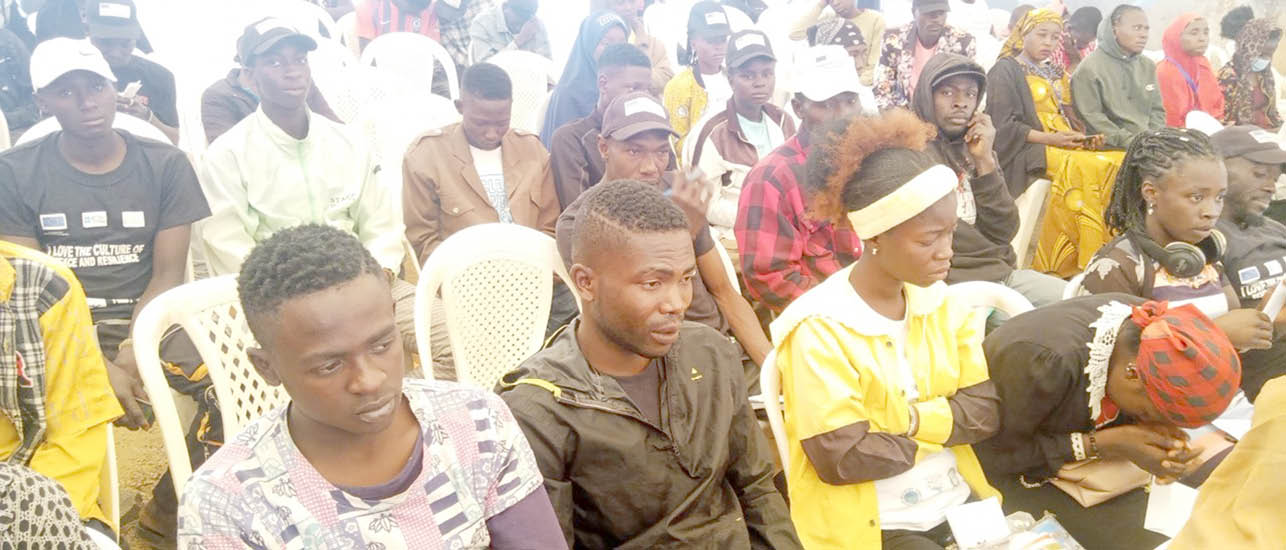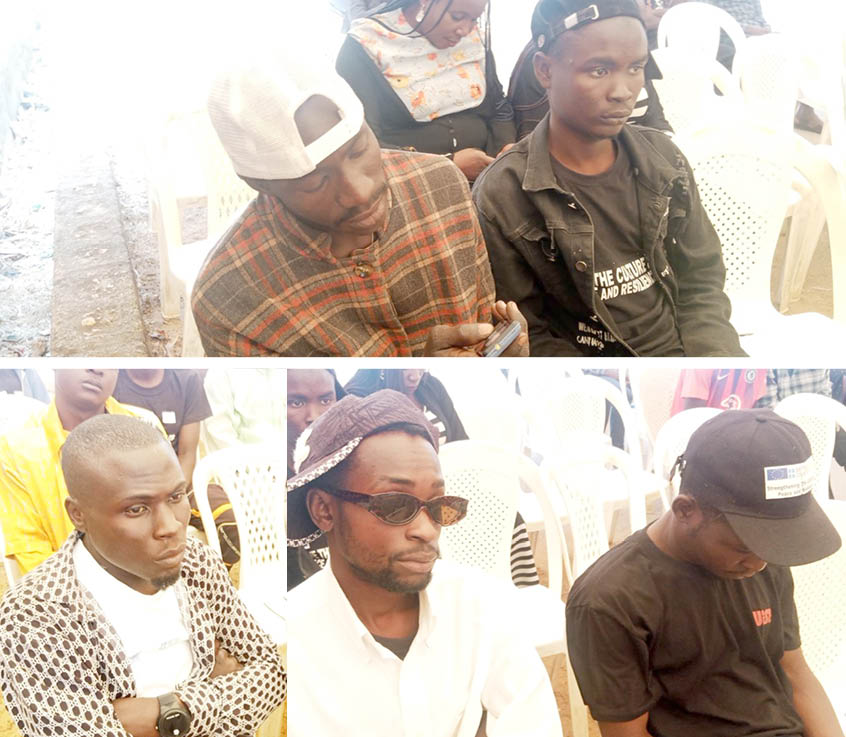How de-radicalisation of youths promotes peace in Plateau
Jos, the Plateau State capital, was at the centre of ethno-religious conflict between 2001 and 2014. Within the period, the peace and hospitality the city was known for was challenged to its foundation. Residents took arms against one another, communities became enemies to themselves. The city became polarised as residents drew battle lines. Social life […]

A cross section of the deradicalised youths during the graduation ceremony in Jos
Jos, the Plateau State capital, was at the centre of ethno-religious conflict between 2001 and 2014. Within the period, the peace and hospitality the city was known for was challenged to its foundation.
Residents took arms against one another, communities became enemies to themselves. The city became polarised as residents drew battle lines. Social life was regimented as residents carved out “no-go-areas.” In such areas there were armies of youths who assigned themselves the responsibility to watch over their environment for any ‘strange” element. Youths became radical, violent and deadly. Killing became part of daily life in the city. Youths were militarised and ready to take revenge against perceived enemies.
That was then; but now, the processes of peace building introduced by governmental and non-governmental organisations to heal old wounds and restore peace brought the conflicts to an end to give room for rebuilding, rehabilitation and restoration of the peaceful nature of the city.
The decade-long violence era produced youths who grew to understand violence as a way of life. According to the director-general of the Plateau State Peace Building Agency (PPBA), Dr Joseph Lengmang, “Children born in Jos from 2001 till this time only grew up to see violence as a normal way of life.”
My long-term target is 200 tonnes per day – Tomato Jos founder
Kaduna gov’ship: PDP asks other opposition parties to join forces
Apart from children, the army of youths who became militants needed to be de-radicalised and de-militarised as a mandatory aspects of the entire peace building project.
But unfortunately for the PPBA, the resources to de-radicalise the youth of the state are not even there. And lack of adequate funding has made the agency ineffective and far from achieving its main objectives.

The director of administration of the agency, Goyit Timothy, confirmed during the monthly media engagement that “the de-radicalisation aspect of the peace building is capital-intensive considering the huge number of youths involved. It is not just enough to de-radicalise the youth, you have to empower them with skills to make them have steady sources of income and make them useful to the society.”
The lack of funds for the peace agency has become a threat to the ongoing peace process in itself. It was obvious that if the youth that took active participation in the violence were not de-radicalised, the work of the peace agency would amount to nothing.
But while the peace agency went about scouting for funding, a consortium of non-governmental organisations came together to help. They include the European Union (EU), British Council, Centre for Peace Advancement in Nigeria (CEPAN) and Agents for Citizens-Driven Transformation (ACT). The consortium identified Jos North Local Government where the violence started in 2001 and within eight months, successfully de-radicalised 256 youths selected from four communities.
At the close-out ceremony of the peace building project held at the Jos North Local Government secretariat last week, the consortium programme manager, Jummai Fidelis said, “These 256 youths were identified and selected from four communities in Jos North, namely Angwa Jarawa, Angwa Rukuba, Naraguta and Bauchi road.”
The 256 youths that participated in the de-radicalisation are just a tip of the iceberg as there are over 100 other communities across the state that need to be de-radicalised.
This notwithstanding, the testimonies of the de-radicalised youths on the day of their graduation confirmed to residents of the state that there is a very huge work to be done to achieve the needed peace in the state. For instance, Choji Brandy said, “It was my father that handed me over to the non-governmental organisations. I did not like the idea in the first place because I wanted to live my life the way I used to. I smoked Indian hemp very well, such that I could not sleep without taking it. And when I took it I would become bold and deadly. In fact, if I took it I would feel like killing somebody. Of a truth, since 2001 I used to carry knife anywhere I went because Jos fight could start without warning.
“My father did not like it. In fact, he did not know where I slept. I did not sleep at home so that they would not disturb me.
“But I thank God for my life today, after the training. I no longer smoke and I have returned to my family house. I have a handiwork now, which is keeping me busy. I was trained on tilling.”
Tina Bulus, alias “Hot Baby” said, “In Angwa Rukuba, everybody knows me as Hot Baby because I took hot drinks (ogogoro) like water. I used to take at least two beer bottles of ogogoro in a day. In fact, ogogoro no de catch me, so I would have to smoke weed to get high. And when I was high I could do anything. My parents disowned me, so I stayed with friends. It was from police station that this non-governmental organisation came, bailed and started training me. Today, I no longer drink ogogoro and I have stopped smoking. I am now a different person. But it was not my fault; some of us had to go into these things because of crisis. I don’t want to remember my past because I will cry.”
Salisu Yahaya also said, “My popular name in Farin Gada is Salisu Rambo because I watched Rambo’s film and liked the way he acted and decided to bear the name. I could kill, just like Rambo. I could fight anytime. I learned how to handle guns during the crisis so that we could defend our community. I must confess that I killed. But I am now a changed person.
“I was recruited into a cult group because everyone knew me as a hard guy. But now, I am busy doing my tailoring work, so I don’t have time for trouble anymore. I am one of the guys that run elections in Jos North.”
These are few testimonies of some of the de-radicalised youths. They have denounced their radical ways and became change agents and peace ambassadors in Jos.
The programme manager of the consortium, Jummai Fidelis said, “They were rehabilitated and equipped with various skills that guaranteed each of them sustainable means of livelihood because the project will be meaningless if we left them idle the way they used to be.
“They have been equipped with various skills and now fully engaged in trade that will make them self-reliant and contribute meaningfully to the society.”
Speaking on behalf of the four communities, the district head of Farin Gada, Joseph Sani Zaruma and community leader of Bauchi Road, Zololo Jibril Baba, expressed gratitude to the consortium for the peace building initiative.
“Since the commencement of the training about seven months ago, peace in the state capital has improved and the rate of crimes has reduced.
“We hope the non-governmental organisations would train more youths to further improve the peace we currently enjoy,” Jibril Baba said.
Sani Zaruma also said, “Our youths have been giving the community sleepless nights over the years. Some of them went to prison and later returned to continue their criminal activities. But the method adopted by these non-governmental organisations has proven very effective. We now enjoy peace in Angwa Rukuba after the training of 50 radical youths. If the organisations can train 200 youths in every community, the entire city will be crime-free.”
While handing over the de-radicalised youths to community leaders, Jummai Fidelis said, “Among these 200 de-radicalised youths we are handing over to the communities are 56 teenage girls. I, therefore, charge the community leaders to monitor them to ensure that they do not go back their old ways.
She admonished the youth to resist being enticed with cash by politicians during elections.
Daily Trust Saturday gathered that with adequate fund, the peace building agency is ready to de-radicalise 5,000 youths across Plateau State.
